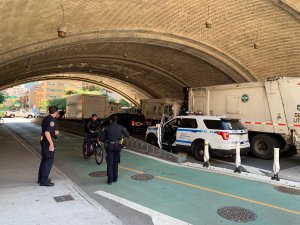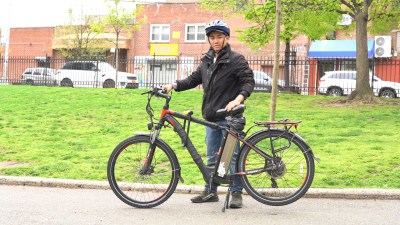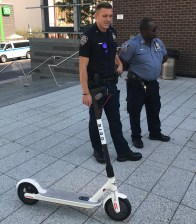Council Bills May Convolute City Policy on Cyclist Safety and Derelict Bikes
The City Council transportation committee will take up a slate of bills tomorrow, including one that would create a “bicycle safety task force” that is opposed by Transportation Alternatives.

Intro 219, introduced in 2014 at the request of Manhattan Borough President Gale Brewer, would establish a panel to “develop recommendations on how make New York City more bicycle-friendly.” Speaking to AMNY, however, Matt Viggiano, director of land use and planning for bill sponsor Rosie Mendez, made it sound like the task force would be yet another venue for people to complain about delivery cyclists and e-bikes.
The two-year task force would have a broad agenda, examining issues that include the allocation of federal funding and the development of physical infrastructure. The group would be made up of commissioners or designees from DOT, the Department of City Planning, and the Parks Department, plus appointees selected by the mayor and council speaker.
Transportation Alternatives believes a task force focused exclusively on cycling should not be necessary, and that bike safety should be a major focus of the city’s existing Vision Zero Task Force instead. TA sent us this statement:
We oppose the bicycle task force bill because bicycling infrastructure and safety should be an integral part of the existing NYC Vision Zero Task Force, and not viewed as something separate. Rather than create an additional meeting and reporting structure, the spirit of this bill should be built into renewed inter-agency commitment to bike safety as a top Vision Zero priority. To that end, having the Department of City Planning’s active participation in the Vision Zero Task Force would only enhance conversations about bike lane expansion and acceleration in the Vision Zero context.
Another bill, Brad Lander’s Intro 787, deals with clearing abandoned bicycles. Under the bill, the city could impound a bike left unattended for 36 hours after it is tagged by an “enforcement officer” from an unspecified agency. Owners would either pay a fine to reclaim impounded bikes or contest impoundments at Environmental Control Board hearings.
Abandoned bikes render bike parking spots useless and turn into eyesores on sidewalks, which is why the Department of Sanitation already has a protocol [PDF] for removing them. As reported by WNYC in 2012, the problem is that DSNY is reluctant to remove bikes even when they are obviously discarded or forgotten. The agency generally doesn’t act unless someone wades through a cumbersome complaint process, leaving a lot of abandoned bikes littering the streets.
It’s not clear how legislation would solve this problem, as opposed to working with DSNY to make its process more effective. A proposed pilot program from the Lower East Side BID offers a model the agency could work from, with a protocol to systematically identify abandoned bikes and refurbish or recycle them [PDF].
Other bills on Wednesday’s agenda:
- Intro 696, sponsored by transportation chair Ydanis Rodriguez, would require DOT to report the number of cyclist-involved crashes in parks as well as roadways, and report the number of injuries and fatalities resulting from those crashes.
- Intros 603 and 604, from Jimmy Van Bramer, amend recently adopted legislation that attached fines to hit-and-run crashes. The bills would increase the minimum fine for repeat violations to $10,000 and require NYPD to report how many times civil penalties were applied and the amount of fines imposed.
- Helen Rosenthal’s Intro 863 would specify that identifying information on vests worn by commercial cyclists be reflective and printed in a font not less than two inches high.
Tomorrow’s hearing begins at 10 a.m. in City Hall council chambers.


